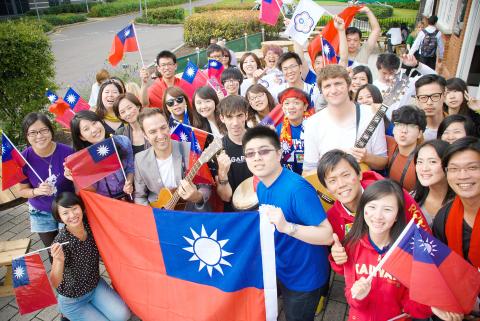The London Organising Committee of the Olympic and Paralympic Games (LOCOG) has allowed spectators to show small-sized Republic of China (ROC) national flags in venues of the Olympic Games, a Ministry of Foreign Affairs official said yesterday.
Hsu Mien-sheng (徐勉生), the director-general of the ministry’s Department of European Affairs, described the move as a “gesture of goodwill” extended to Taiwan after an ROC flag was removed from an array of 206 national colors, representing the nations competing in the Olympic Games, in a London street. The display was organized by the Regent Street Association.
The Taipei Representative Office in the UK had reached an understanding with the LOCOG that Olympic-venue security staff would allow spectators to dress in the colors of the ROC flag, paint the ROC flag on their faces, or bring small ROC flags with them to the venues, Hsu said.

Photo: courtesy of Chen Szu-wei
Hsu said that the display of the ROC flag in seating areas is not in compliance with the protocol signed between Taiwan and the International Olympic Committee (IOC) in 1981, known as the “Olympic Model,” to resolve issues stemming from a sovereignty dispute with China.
In accordance with the protocol, Taiwan competes in the Olympics under the name “Chinese Taipei” and is represented by the Chinese Taipei Olympic flag at Olympic venues, rather than the ROC flag.
“Strictly speaking, only the Chinese Taipei Olympic flag recognized by the IOC is allowed in Olympic venues, including its audience areas,” Hsu said.
According to a Central News Agency report, large ROC flags are still forbidden until changes are made to the model. Hsu did not verify that report, but he said the Olympics organizers do not allow spectators of any nationality to wave large national flags of any country, to keep them from disturbing other people in the audience.
The Chinese-language Liberty Times (the Taipei Times’ sister paper) reported that some Taiwanese spectators were warned by Olympics staff for waving large ROC flags to cheer on the country’s taekwondo athletes, Yang Shu-chun (楊淑君) and Wei Chen-yang (魏辰洋), during Wednesday’s matches.
A woman surnamed Chen (陳) told the Liberty Times that Olympics staff asked them not to wave the flag and even tried to grab their flag. She added that they were kept under close watch by staff members until they left.
Hsu said he was not able to verify the report.
He added that the nation’s representative office has on several occasions expressed concerns to the Regent Street Association over its replacing the ROC flag with a Chinese Taipei Olympic flag.
The LOCOG has confirmed that it advised the association to remove the ROC flag after a complaint from the Chinese embassy.
The association made it clear to the representative office that it “meant no disrespect” to Taiwan and felt sorry for any offense caused, Hsu said.
The association was “overloaded” with telephone complaints and e-mails from UK politicians, ordinary British citizens and people from other countries about the replacement of the ROC flag in the display, Hsu said.
Some members of the UK parliament also sent letters to the association to express their disapproval and demand a remedy, Hsu added.

CHAOS: Iranians took to the streets playing celebratory music after reports of Khamenei’s death on Saturday, while mourners also gathered in Tehran yesterday Iranian Supreme Leader Ayatollah Ali Khamenei was killed in a major attack on Iran launched by Israel and the US, throwing the future of the Islamic republic into doubt and raising the risk of regional instability. Iranian state television and the state-run IRNA news agency announced the 86-year-old’s death early yesterday. US President Donald Trump said it gave Iranians their “greatest chance” to “take back” their country. The announcements came after a joint US and Israeli aerial bombardment that targeted Iranian military and governmental sites. Trump said the “heavy and pinpoint bombing” would continue through the week or as long

TRUST: The KMT said it respected the US’ timing and considerations, and hoped it would continue to honor its commitments to helping Taiwan bolster its defenses and deterrence US President Donald Trump is delaying a multibillion-dollar arms sale to Taiwan to ensure his visit to Beijing is successful, a New York Times report said. The weapons sales package has stalled in the US Department of State, the report said, citing US officials it did not identify. The White House has told agencies not to push forward ahead of Trump’s meeting with Chinese President Xi Jinping (習近平), it said. The two last month held a phone call to discuss trade and geopolitical flashpoints ahead of the summit. Xi raised the Taiwan issue and urged the US to handle arms sales to

State-run CPC Corp, Taiwan (CPC, 台灣中油) yesterday said that it had confirmed on Saturday night with its liquefied natural gas (LNG) and crude oil suppliers that shipments are proceeding as scheduled and that domestic supplies remain unaffected. The CPC yesterday announced the gasoline and diesel prices will rise by NT$0.2 and NT$0.4 per liter, respectively, starting Monday, citing Middle East tensions and blizzards in the eastern United States. CPC also iterated it has been reducing the proportion of crude oil imports from the Middle East and diversifying its supply sources in the past few years in response to geopolitical risks, expanding

Pro-democracy media tycoon Jimmy Lai’s (黎智英) fraud conviction and prison sentence were yesterday overturned by a Hong Kong court, in a surprise legal decision that comes soon after Lai was jailed for 20 years on a separate national security charge. Judges Jeremy Poon (潘兆初), Anthea Pang (彭寶琴) and Derek Pang (彭偉昌) said in the judgement that they allowed the appeal from Lai, and another defendant in the case, to proceed, as a lower court judge had “erred.” “The Court of Appeal gave them leave to appeal against their conviction, allowed their appeals, quashed the convictions and set aside the sentences,” the judges